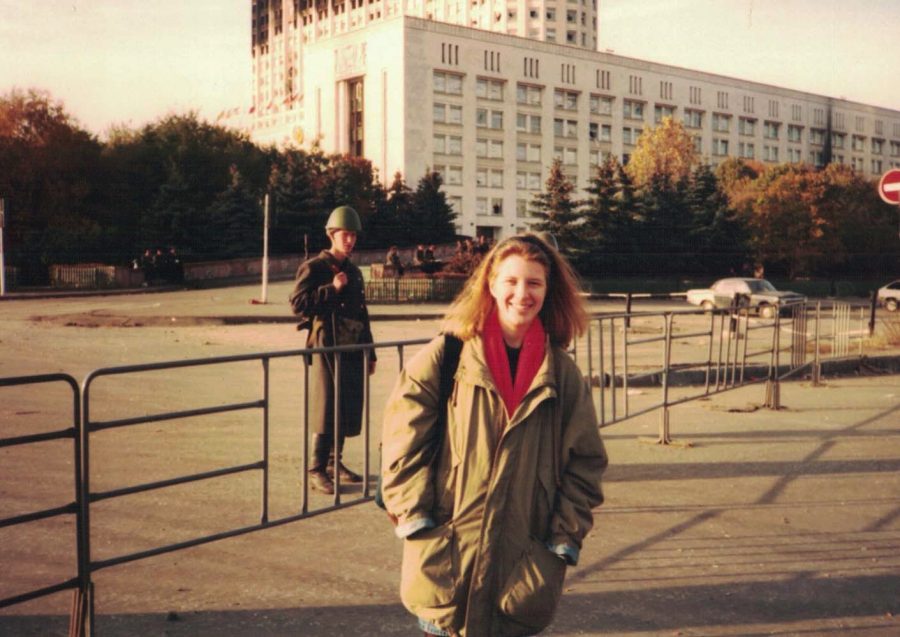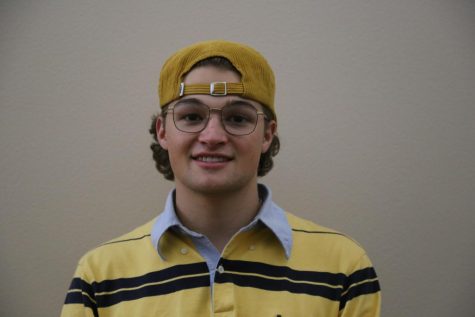Living through the fall of Communism
Creek social studies teacher Kristina Bybee reflects on studying abroad in Russia during the fall of Communism.
Photo courtesy of Kristina Bybee
Young social studies Kristina Bybee studying abroad in Russia. This was taken in front of a destroyed and charred Belyy Dom, which is the Russian equivalent of the White House. In her time abroad, she experienced history in the form of communist and democratic rallies.
May 10, 2021
In 1991, while Russia was starting to tear apart at the seams, high school graduate Kristina Bybee knew that she wanted to study international relations. And what better time to do it than “right when the Soviet Union was falling apart.” CCHS Social Studies teacher, Kristina Bybee found herself trying to juggle college, food shortages, and the fall of Communism.
She gave it a few years to calm down, out of fear of her own safety, and in the summer of 1993, she finally went. She moved into a house with two host-parents, and a host-sister that was around her age. She continued with her studies while simultaneously trying to assimilate into the polarizing culture that came with living in Russia.
It was quite the adjustment getting used to the customs in Russia. The differences were vast, and to an unknowing college student, intimidating. While she was standing in line trying to buy stamps, an old lady abruptly shoved her way in front of Bybee, causing the already long line to get even longer. After this altercation, she learned that “you had to just push your way to the front.” It was the small cultural differences like this one that created such a foriegn environment.
It was right as she was settling in, and getting used to the lay of the land when the hardline Communists took control of the Belyy Dom, the russian equivalent of the White House. They barricaded themselves inside as a protest and a show of power. Both of Bybee’s journalist host parents thought it would be an important experience and suggested that she went.
Her host sister got her changed into more Russian style clothes, and explained to her that she couldn’t speak in English, or even at all, “because if they hear you’re American, that could cause trouble.”
The leaders of the protest were going on about “how dangerous America and the Americans were,” and that they had to “root out, you know, democracy and Americans, and go after them.” It was at this point that Bybee and her host sister knew that it was time to leave.
On the contrary, her host family and she attended a democratic rally. This one was significantly more peaceful, and there were a lot less chants threatening violence on the Americans.
A few days after the protests, Bybee’s host parents were out working, and she was home alone with her host-sister. The President at the time, Boris Yeltsin, had had enough. He ordered tanks to go to Moscow, and directed them to fire on the Belyy Dom. Tank blasts and gunshots echoed throughout the streets in front of their house. Quickly, they turned off the lights and proceeded to wait out the chaos.
All in all, her experiences in Russia gave her an unconventional perspective. “I think it made me who I am,” Bybee told me. She believes that while there are lots of flaws to the United States, and at times it feels like a terrible country to live in, it could always be worse. She said that “having that ability to be able to speak out against our government, and try to make things better,” is not something Russia does not share with the U.S., and it is something that gets taken for granted more often that it should.



















